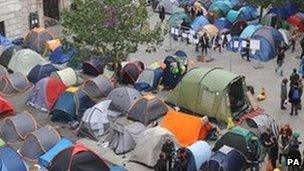St Paul's protest: City of London 'pauses' legal action
- Published

There are more than 200 tents around St Paul's Cathedral
The City of London Corporation has "paused" its legal action against the anti-capitalist protest camp outside St Paul's Cathedral.
Stuart Fraser, the corporation's policy chairman, said the decision followed the cathedral's move to suspend its own legal action against the camp.
The church said it had wanted to "engage directly" with the protesters.
Occupy London Stock Exchange said it was "delighted" the two potential legal cases had been suspended.
Mary Singer, an Occupy London protester, said: "We are all very happy to see that the threat of court proceedings against the camp is being reviewed by the City.
"It is important that our right to protest is respected."
The City of London Corporation said it wanted to "leave more space for a resolution" of what to do about the 200-tent Occupy London camp.
The church said it had wanted to "engage directly" with the protesters.
Mr Fraser said: "'The church has changed its standpoint and announced it is suspending legal action on its land.
'Measured solution'
"Given that change, we've pressed the 'pause' button overnight on legal action affecting the highways - in order to support the cathedral as an important national institution and give time for reflection.
"We want to leave more space for a resolution of this difficult issue - while at the same time not backing away from our responsibilities as a Highway Authority.
"We're hoping to use a pause - probably of days not weeks - to work out a measured solution.
"We will make a further announcement tomorrow lunchtime."
Earlier in the day, the cathedral authorities said they had made the decision to abandon legal proceedings following a meeting with the Bishop of London, Dr Richard Chartres.
The bishop has been in charge of the cathedral's response to the camp following the resignation of the Dean of St Paul's, the Right Reverend Graeme Knowles, on Monday.
Members of the Chapter of St Paul's also met representatives from the camp on Tuesday morning.
'Corporate greed'
Dr Chartres said: "The alarm bells are ringing all over the world. St Paul's has now heard that call.
"Today's decision means that the doors are most emphatically open to engage with matters concerning not only those encamped around the cathedral but millions of others in this country and around the globe."
Canon Michael Colclough - speaking for the Chapter of St Paul's - said he hoped the church could be a "brokering agent" between the protesters and the Corporation of London.
He said the church had said all along that it "couldn't condone this ending in violence".
On Friday, the cathedral and corporation had announced they would try to obtain separate High Court injunctions to clear the 200-tent camp.
A spokeswoman said the local authority was not opposed to the right to protest but did not want a "campsite" in the City.
She said: "We have never asked protesters to leave, we have only asked them to move their tents."
The Canon Pastor of St Paul's, the Right Reverend Michael Colclough: ''This is not a PR stunt''
The Occupy London camp has been outside the cathedral since 15 October. People taking part have said they are protesting against inequality and corporate greed in the City.
The church decided to close on 21 October on health and safety grounds as a result of the camp but partly reopened on Friday.
Occupy London protester Sam Chase described the church's announcement as "wonderful news".
The 48-year-old from Shepherd's Bush said: "The move by St Paul's was a wonderful development.
"There are some people in the cathedral who have stood up for what they believe in.
"A disobedient attitude to capitalism is needed."
Meanwhile, the cathedral said it had also asked investment banker Ken Costa to head a group looking to reconnect "the financial with the ethical".
Mr Costa, the former chairman of UBS Europe, would work with City, church, public figures and the former Canon Chancellor Giles Fraser, who would aim to represent the views of the protesters.
Dr Fraser, who has been sympathetic to protesters, resigned from the cathedral last week.
It is thought differences over the handling of the protest prompted Dr Fraser's decision, the BBC's religious affairs correspondent Robert Pigott said.
- Published1 November 2011
- Published1 November 2011
- Published1 November 2011
- Published31 October 2011
- Published26 October 2011
- Published19 October 2011